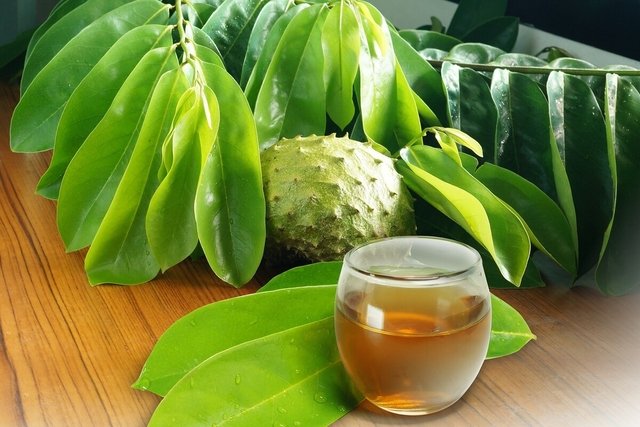Soursop tea is prepared using soursop leaves, which are rich in acetogenins, alkaloids, phenolic compounds and vitamins. These substances can have an anti-inflammatory, antihypertensive, immunomodulatory, antimicrobial and antioxidant effect.
Soursop tea can be used to help treat fevers, hypertension, high cholesterol and diabetes, as approved by your doctor.
Despite having several health benefits, soursop tea should be consumed in moderation. Excessive intake can lead to side effects like hypotension, nausea and vomiting.

Health benefits
Soursop leaf tea can serve several functions in the body, the main ones being:
1. Managing diabetes
Soursop leaves contain phytochemical compounds, like tannins, flavonoids and triterpenoids, which help to regulate blood sugar levels. These substances inhibit the activity of an enzyme related to carbohydrate metabolism. Therefore, drinking soursop tea every day can help to keep blood glucose levels within normal ranges in people with diabetes or pre-diabetes.
Read about other teas for blood sugar that diabetics can take to regulate levels.
2. Fighting cancer
Soursop leaves have antioxidant and cytotoxic compounds that help to eliminate free radicals from the body. This can prevent cell damage and prevent the development of cancer.
This medicinal plant can also inhibits the growth of malignant cells, which can play a role in fighting different types of cancer, like colon, breast, prostate and pancreatic cancer. However, soursop tea does not replace the treatment prescribed by your doctor, and should only be consumed as a complement.
3. Eliminating intestinal parasites
Some of the compounds isolated from soursop leaves and seeds have show to be effective against parasites that cause infections like amoebiasis, malaria and trypanosomiasis.
Also recommended: Symptoms of Parasites: 7 Signs (with Online Symptom Test) tuasaude.com/en/symptoms-of-pinworms4. Combating viruses and bacteria
Soursop leaf extracts have flavonoid, steroid and alkaloid compounds with antibacterial properties against Staphylococcus aureus and Escherichia coli. These can enhance the effect of antibiotics and promote the more effective elimination of microorganisms, as well as prevent the replication and spread of some viruses.
5. Lowering blood pressure
Soursop leaf extract contains alkaloid compounds such as coreximine, anomurine and reticulin. They also have essential oils that contain hypotensive properties which block calcium ion channels and allow blood vessels to dilate. This can be beneficial for managing blood pressure in those with hypertension.
6. Boosting immunity
Soursop tea naturally contains properties that promote increased leukocyte production. These are blood cells that are part of the immune system and help to prevent and fight infections, like the flu and colds.
7. Protecting the liver
Soursop leaves have a hepatoprotective effect,and can prevent liver damage caused by medications like acetaminophen that can impair liver functioning when used in excess.
Additionally, soursop tea can help combat hyperbilirubinemia or jaundice, which is caused by liver or bile duct changes.
Also recommended: 11 Symptoms of Liver Disease (With Online Symptom Quiz) tuasaude.com/en/liver-disease-symptoms8. Treating stomach problems
Soursop leaf extract has a gastric protective effect, which can help to relieve the symptoms of some gastric problems, such as stomach ulcers and gastritis. It naturally contains antioxidant compounds that help protect the stomach walls and reduce acidity, pain and discomfort.
Read about other home remedies for gastritis that you can prepare for gastric symptoms and stomach ulcers.
9. Reducing stress and anxiety
Due to the content of alkaloid compounds, soursop tea helps reduce anxiety, stress and insomnia, as these substances act on the central nervous system. This tea can have a relaxing effect and boost mood.
10. Promoting wound healing
Soursop leaf extract contains antioxidant compounds that protect tissues against oxidative damage. It can promote wound healing process, as well as increasing the availability of collagen and proteins that promote the growth of new cells to repair tissue. Therefore, soursop tea in the form of a poultice can be used to place on wounds and, thus, promote faster healing.
Properties of soursop tea
Soursop leaves are rich in phytochemicals, such as acetogenins, alkaloids, phenolic compounds, vitamins and carotenoids, which can offer hypoglycemic, hypotensive, antispasmodic, sedative, anticancer, anti-inflammatory, immunomodulatory, antimicrobial, healing and sedative properties. Learn more about the benefits of soursop and how it can be consumed.
How to make
Soursop tea is easy and quick to make. You can consume 2 to 3 cups of soursop tea per day, preferably after meals.
Ingredients
- 10 g of dried soursop leaves
- 1 liter of boiling water
Directions
To make the tea, simply place the soursop leaves in boiling water and soak for about 10 minutes. Then, strain and drink while warm, after meals.
Duration of use
There are no scientific studies that confirm the safe duration of soursop tea consumption, but the general recommendation for any type of tea is to drink it for three months followed by a one month break.
However, it is important to consult a medicinal plant specialist or your doctor before consuming soursop tea, as the duration time may vary depending on each person's health status.
Side effects
Although soursop has several benefits, the consumption of soursop tea should be guided by a doctor or medicinal plant specialist, as excessive intake can lead to nausea, vomiting, a sudden drop in blood pressure and intestinal symptoms. Because it contains antimicrobial properties, it can also eliminate the good bacteria from the body when consumed in excess.
Furthermore, pregnant women should avoid consuming soursop tea as it may lead to premature birth or miscarriage.
